 Petzlover
Petzlover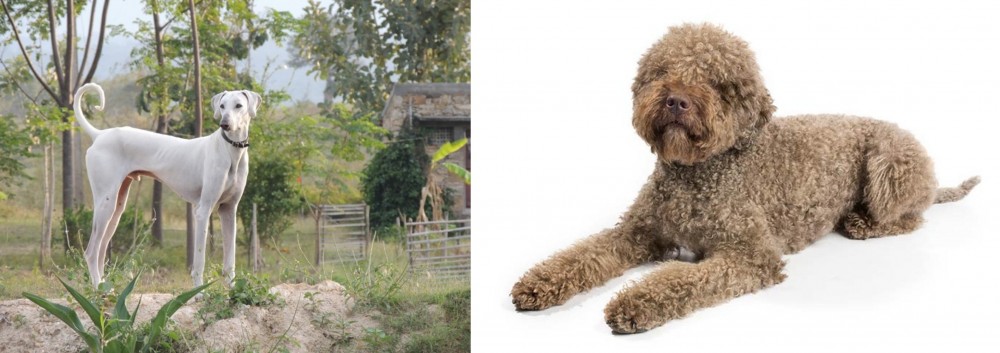 Chippiparai is originated from India but Lagotto Romagnolo is originated from Italy. Chippiparai may grow 15 cm / 6 inches higher than Lagotto Romagnolo. Both Chippiparai and Lagotto Romagnolo are having almost same weight. Both Chippiparai and Lagotto Romagnolo has almost same life span. Both Chippiparai and Lagotto Romagnolo has same litter size. Chippiparai requires Low Maintenance. But Lagotto Romagnolo requires Moderate Maintenance
Chippiparai is originated from India but Lagotto Romagnolo is originated from Italy. Chippiparai may grow 15 cm / 6 inches higher than Lagotto Romagnolo. Both Chippiparai and Lagotto Romagnolo are having almost same weight. Both Chippiparai and Lagotto Romagnolo has almost same life span. Both Chippiparai and Lagotto Romagnolo has same litter size. Chippiparai requires Low Maintenance. But Lagotto Romagnolo requires Moderate Maintenance
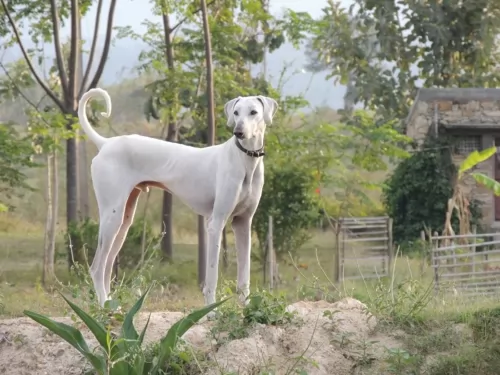 The Chippiparai is a working dog found in India and until recently there has been little interest in the purity of any breed, but rather only an emphasis on the abilities of the dog. They are only beginning to research the origin and history of their native dogs such as the Chippiparai. Not much is known about the origin of the breed except that it is found almost exclusively in Tamil Nadu and Keraia in the southern part of the subcontinent of India. Other than this there is much speculation about the breed’s origin but very little-known facts. It is indeed an ancient breed; however, its origin could be thousands of years ago or simply hundreds of years ago.
The Chippiparai is a working dog found in India and until recently there has been little interest in the purity of any breed, but rather only an emphasis on the abilities of the dog. They are only beginning to research the origin and history of their native dogs such as the Chippiparai. Not much is known about the origin of the breed except that it is found almost exclusively in Tamil Nadu and Keraia in the southern part of the subcontinent of India. Other than this there is much speculation about the breed’s origin but very little-known facts. It is indeed an ancient breed; however, its origin could be thousands of years ago or simply hundreds of years ago.
• Perhaps it is a descendant of the Saluki as it resembles this breed quite a bit. It has been believed for some time that the Saluki is the original sighthound and the source of all sighthound breeds. The Saluki was very popular in the Middle East, especially in Persia and Arabia from which it could easily have spread to India. It would then have been shared from Northern India to Southern India where the Chippiparai is found.
• Perhaps the Chippiparai is a descendent of sighthounds from Central Asia and Afghanistan – the Tazi, Taigan, Hortaya Borsaya or the Afghan Hound. This part of Central Asia had more trade, influence and contact with the Indian subcontinent early in their history than with any other region. The Chippiparai is considered by some to be more like these sighthounds than like the Saluki and the interaction between these regions has a much longer history than the Middle East and India.
• It is also speculated that the Chippiparai might have been developed completely and uniquely from the local street and working dogs. With the civilization of India being one of the oldest in the world, it is considered a possibility that the Chippiparai is the descendent of the Harappan hunting dogs that probably were developed by the Indus Valley or Harappa roiling class.
Wherever the Chippiparai came from, they were the exclusive property of the wealthy and ruling castes. These upper castes were the only ones that could legally hunt with dogs or afford to feed one. The royal classes of Tiruneivell, Thanjavur, and Madurai all fed the popularity of the breed among the upper castes. They were coursing dogs used to chase down the prey once it was sighted. The Chippiparai are incredibly fast runners and would catch almost any prey and either hold it or kill it for their hunter. The Chippiparai, when not hunting, had to be chained so they would not chase any small animal that they saw. This confinement also added to the purity of the breed as random breeding was prevented.
The southern part of the Indian subcontinent is extremely hot with routine temperatures over 100’. The Chippiparai was developed to withstand these extreme temperatures and is more heat tolerant than most any other breed. They also need very little food and are resistant to the many parasites and diseases found in southern India.
Harboring the belief that Indian dogs were not as good as European ones, the occupying countries of Portugal, France, and Britain, had no interest in the Chippiparai, again leaving the breed to develop naturally on their own with little or no interbreeding. They also received no formal recognition because Indian culture only valued the dog for its working abilities. There was no Indian Kennel Club until 1956.
The Chippiparai is now very rarely and only found in the area of its birth. Many believe the breed is in danger of becoming extinct and even though it is now registered with Indian Kennel Clubs it is not often shown in their dog shows. Lovers of the breed are now attempting to get Indians to recognize that the Chippiparai is a great companion animal and attempting to save the breed.
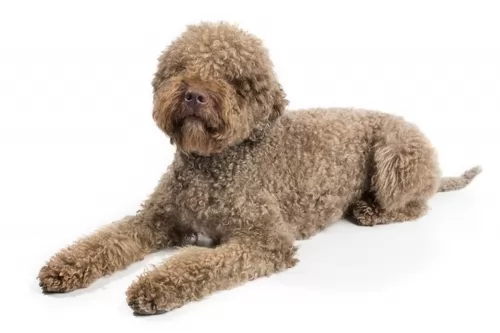 The Lagotto Romagnolo dog, known as the Water Dog of Romagna, and falling into the sporting dog category, is a pure breed dog which comes from the Romagna region of Italy.
The Lagotto Romagnolo dog, known as the Water Dog of Romagna, and falling into the sporting dog category, is a pure breed dog which comes from the Romagna region of Italy.
The dog’s role was that of gun dog and to retrieve water birds. Today he is more used as a truffle hunter in Italy as well as being used for a therapy dog.
In 2015 the Lagotto Romagnolo was accepted by the American Kennel Club into the sporting dog category.
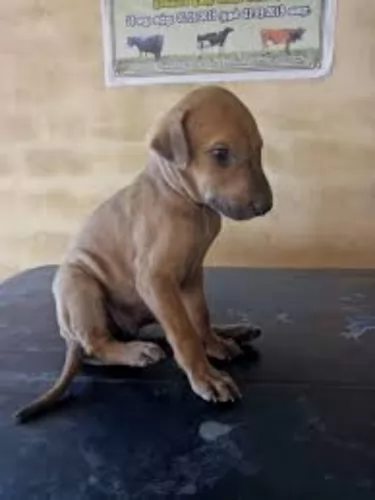 The Chippiparai is a typical sighthound although their size and appearance will vary more than that of registered purebred sighthounds. Typically, they will have a long, domed head with small erect ears and dark eyes. Their muzzle will be as deep and wide as the skull but longer. Their legs are straight and long, their chest is roached back and deep, giving them, an appearance very similar to a greyhound or other sighthound.
The Chippiparai is a typical sighthound although their size and appearance will vary more than that of registered purebred sighthounds. Typically, they will have a long, domed head with small erect ears and dark eyes. Their muzzle will be as deep and wide as the skull but longer. Their legs are straight and long, their chest is roached back and deep, giving them, an appearance very similar to a greyhound or other sighthound.
They have a long curly tail, and their coat can vary greatly in color. They are medium sized, and their coat is short, shiny and close. He is very slender and sleek, which along with his long legs gives him that incredible speed. They are thin with visible ribs.
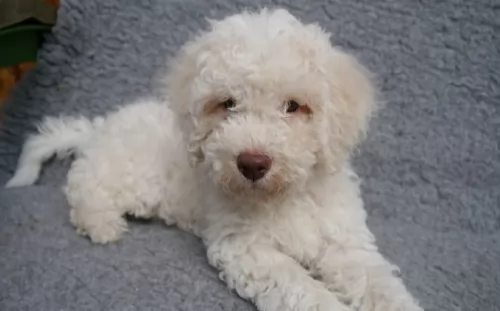 The Lagotto Ramagnolo is a medium sized dog where both males and females stand anything between 41 and 48cm and weigh 11 to 16kg.
The Lagotto Ramagnolo is a medium sized dog where both males and females stand anything between 41 and 48cm and weigh 11 to 16kg.
He is well proportioned and muscled, he has large yellow or brown eyes with a black or brown/pinkish nose, floppy, rounded ears and a tail which is left long these days.
The Lagotto Romagnolo has a waterproof double coat with a woolly texture and which hardly sheds, putting him as being hypoallergenic.
The coat can be in a number of different colors such as cream, grey, white, apricot, brown or tan. The face of the dog has a bit of a beard as well as noticeable bushy eyebrows.
Because the Lagotto is a sporting breed, he has had to call on all his senses to retrieve water birds. Good eyesight, sharp listening skills and an excellent sense of smell makes him the ideal gun dog but he also makes a loyal family pet.
He makes a good playmate for children and he happily gets on well with other pets in the home. Being an intelligent dog, he is easy to train too.
The sporting past of his has made it that he isn’t a couch-potato type of dog and he will require mental- and physical stimulation. His role as gun dog meant that he was required to retrieve birds in water, and he is an excellent swimmer and will happily plunge into water to join you in a swim.
Have him trained and socialized and you’ll find him tuned in to obeying your commands. Because of his smallish size, the Lagotto can adjust well to life in the city or in the countryside, just so long as he still receives his full quota of exercise.
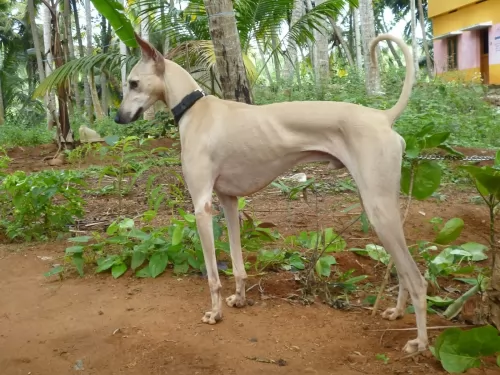 The Chippiparai is a loving, gentle family dog if well socialized, well trained and well exercised. They are very intelligent and need human companionship. Once they are living with a human family, they are very protective of that family. They are for the most part peaceful and quiet dogs. They are loyal and loving but they are not overly affectionate. Cuddlers they are not, and they do not like to play rough with children.
The Chippiparai is a loving, gentle family dog if well socialized, well trained and well exercised. They are very intelligent and need human companionship. Once they are living with a human family, they are very protective of that family. They are for the most part peaceful and quiet dogs. They are loyal and loving but they are not overly affectionate. Cuddlers they are not, and they do not like to play rough with children.
Accepting and loving within the family, the Chippiparai are equally hesitant and shy around strangers. They can be suspicious, but they are not aggressive. They are just very aloof with strangers, yet they hardly ever bark.
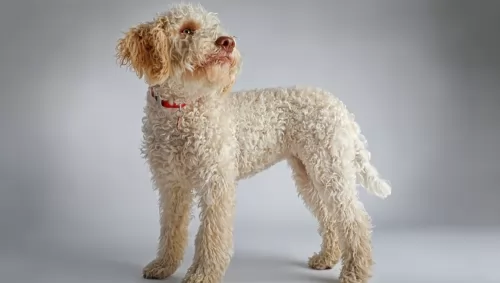 Many dog lovers appreciate that the Lagotto Romagnolos is looked upon as an allergy-friendly dog with his non-shedding coat.
Many dog lovers appreciate that the Lagotto Romagnolos is looked upon as an allergy-friendly dog with his non-shedding coat.
Being a medium sized dog, he is manageable too. Add to that excellent characteristics such as being amicable, friendly and loving. Training him some important, basic commands won’t be difficult either and you can add in intelligence to his list of good qualities.
As loving dogs, they are dedicated to their families, getting on well with children in the home as well as with other pets. He is a social dog and just longs to be a treasured member of the family like anybody else.
Count him in with all your activities and you’re going to have a one-in-a-million undemanding and contented canine friend.
 There are no clinical studies regarding the health and health history of the Chippiparai, so little is known about their long-term health. However, most who know the breed, believe it is an incredibly healthy one. They seem to have a lot less genetically transmitted health issues than other purebreds. Because of their isolation for centuries in India, they have developed immunities and resistance to most parasites and diseases other dog suffer from.
There are no clinical studies regarding the health and health history of the Chippiparai, so little is known about their long-term health. However, most who know the breed, believe it is an incredibly healthy one. They seem to have a lot less genetically transmitted health issues than other purebreds. Because of their isolation for centuries in India, they have developed immunities and resistance to most parasites and diseases other dog suffer from.
Because of this you should look for the types of issues that occur in dogs of this size and build. Have them tested by the Canine Eye Registration Foundation and the Orthopedic Foundation for Animals.
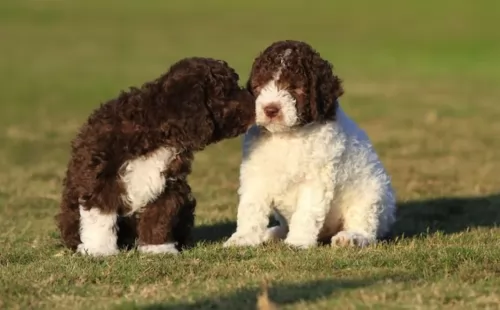 Lagotto live roughly 16 years with the best food, exercise and loving environment. Some health issues may well crop up, though unlikely, but it is good to be aware of them.
Lagotto live roughly 16 years with the best food, exercise and loving environment. Some health issues may well crop up, though unlikely, but it is good to be aware of them.
You hear the words ‘Hip dysplasia’ being bandied about a lot in the world of dogs because it is such a common dog ailment. Your dog can’t be cured but there are a range of management options that will ensure your pet remains as comfortable as possible.
It is such a common joint disease where the hips partially dislocate. Without veterinary intervention, it can be debilitating and painful. It is essentially a genetic condition but diet and environmental factors can come into play too.
You don’t want your pet putting on too much weight as this puts extra strain on the joints.
Your dog has loss of function because of the degeneration of cells or tissues. The illness affects different parts of the brain in dogs. You’ll notice a mild tremor of the head and uncoordinated movements. Your vet will want a history of your pet’s health as well as lab tests.
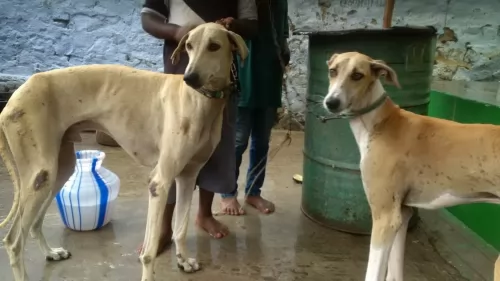 Do not overfeed your Chippiparai. Feed twice a day and no more than a total of 2.5 cups of high quality dry food.
Do not overfeed your Chippiparai. Feed twice a day and no more than a total of 2.5 cups of high quality dry food.
As mentioned previously the Chippiparai seems to have no genetic diseases or issues and very few acquired ones. However, he is sensitive to anesthesia and some foods. He is intolerant to cold weather and has a hard time with his pads on hard surfaces. Some Chippiparai might experience some of the ailments other breeds like them experience.
Both Elbow and hip are possible. This can cause arthritis and lameness. This occurs when the bone does not fit well into the joint.
This can cause lameness as well. The kneecaps slide over the knee instead of staying in place.
This is a hunting dog and he will want to hunt. They are incredibly fast and need the opportunity to run. Brisk walks will not be enough for this dog. He is very energetic. They will chase any small animals. It is not recommended that you have small pets even small dogs or cats with a Chippiparai. Having been bred for centuries to hunt, they are not likely to respond to any commands if they are off lease and chasing prey. Do not allow them to be off leash unless in a fenced area, and that fence needs to be 8 feet tall as they can easily jump a seven-foot fence. Try they at coursing, agility, fly ball and frisbee competitions.
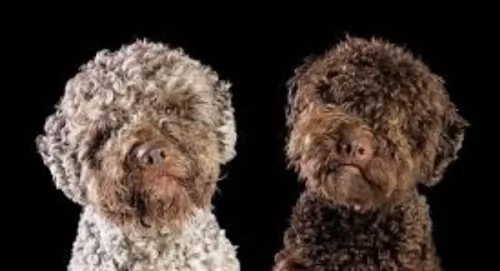 Not everyone agrees with how to take care of the Lagotto’s rough, waterproof coat of thick curls. The coat doesn’t shed much but it can pick up grass and small twigs easily. Unless brushed out at least 2 or 3 times a week, the coat can become matted and unruly. For many the coat needs to be trimmed regularly.
Not everyone agrees with how to take care of the Lagotto’s rough, waterproof coat of thick curls. The coat doesn’t shed much but it can pick up grass and small twigs easily. Unless brushed out at least 2 or 3 times a week, the coat can become matted and unruly. For many the coat needs to be trimmed regularly.
The Lagotto needs plenty of exercise. His hunting and retrieving past has given him a natural urge to retrieve and he loves going after every ball you throw him. He will also love to join you on your daily walks and it gives him the chance to sniff around. With swimming being added in, this dog is your true sporting buddy.
Make sure you feed your Lagotto the very best quality food there is to ensure his well-being and longevity. If you're unsure about whether he is getting in all the necessary vitamins and minerals with his food, speak to a dog expert as good food is key to a happy, healthy dog.